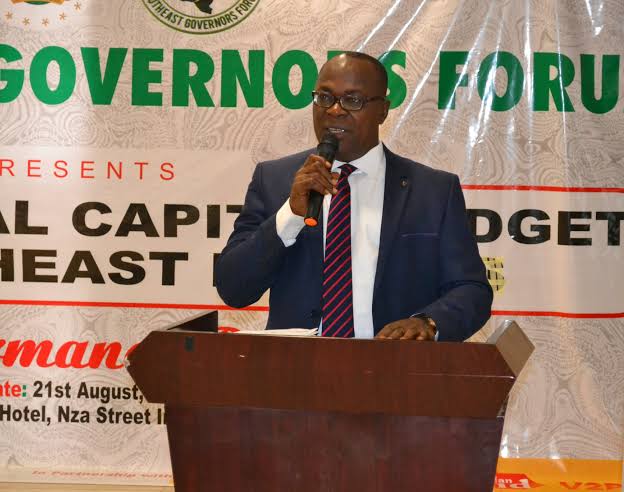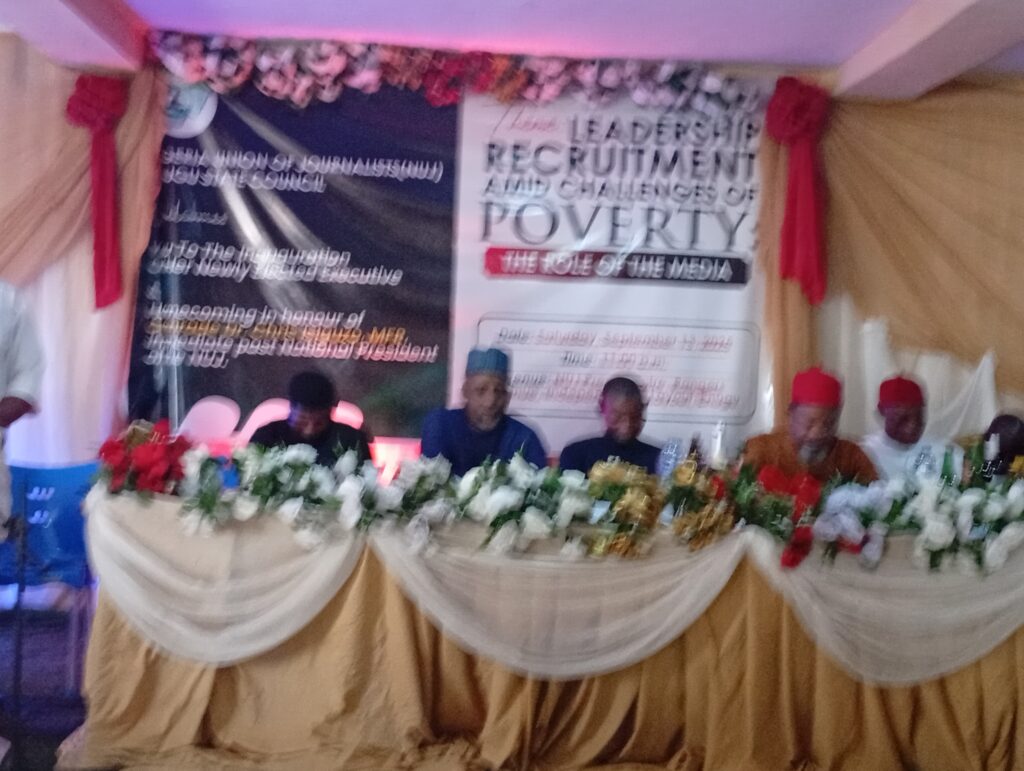Vice -Chancellor of the University of Nigeria,Nsukka, Professor Simon Ortuanya,has advocated identification of one’s leadership method , analysing of one’s team’s current effectiveness, fostering a positive recruiting culture, developing and maintaining recruiter accountability as some of the methods needed for leadership recruitment amidst challenges of poverty.
Ortuanya noted that “leadership recruitment amidst poverty is a test of our collective conscience”. He spoke during the celebration of the homecoming of the immediate past national president of the Nigerian Union of Journalists NUJ,Comrade Dr Chris Isiguzo and the inauguration of the new Executives of the Enugu state council of the union held Saturday , at the RT. Hon Dr Ifeanyi Ugwuanyi, NUJ press center , Enugu.
Speaking on the topic, ” Leadership Recruitment Amidst Challenges of Poverty: The Role of The Media”, Prof. Ortuanya, said , becoming an effective recruiting leader requires methods which included identification of one’s leadership method . This he said, is to help the person identify his or her strength and weaknesses and create effective leadership strategies that provide direction to his or her team.. He mentioned autocracy, democracy, aristocracy as some common leadership strategies.Others are :
“Analyze your team’s current effectiveness”. He explained that a good recruiting leader should have the ability to analyze how effective his current team is regarding sourcing and recruiting new hires through certifying the hiring of qualified and focused recruiters for the company or organizations.
“Foster a positive recruiting culture”, Prof Ortuanya explained here that at the heart of the steps towards becoming a good recruiting leader is finding ways to actively participate in the recruitment and hiring process. This he said , can help increase the productivity of one’ team. He said the Leader should lead by example as it will help recruiters understand exactly what’s expected of them during recruitment, as a good recruiting leader demonstrates those expectations through his or her direct participation.
“Develop and maintain recruiter accountability”; Professor Ortuanya said , implementing different accountability methods can also help improve the quality of candidates a team discovers and recruits.
“Update your recruitment Strategy”, here the Keynote speaker said, an updated recruitment strategy in line with current market and hiring trends can help increase the likelihood of finding quality candidates for one’s company and even political positions. and focusing on diversity in your recruiting strategies can also help you expand your candidate pool and source qualified professionals for your company.
“Updating your strategies may allow you to identify and mitigate current recruiting obstacles your company experiences because this process compels you to analyze each component of your current strategy to weigh its effectiveness
“Additionally, methods such as regular performance reviews or weekly recruitment reports can further increase the accountability of the recruiting team
“These steps can also apply to the way and manner electorates choose or recruit their leaders even in the face of the daunting challenge of poverty.”. Ortuanya said.

Pix: Prof Ortuanya
Speaking on poverty as a challenge in leadership recruitment, the Keynote speaker said ,”Poverty is a state of being destitute or impecunious. Poverty is not just an economic condition; it is also a political weapon of subjugation.
“According to the official household survey data from Nigeria’s National Bureau of Statistics, 30.9 percent of Nigerians lived below the international extreme poverty line of $2.15 per person per day in 2018/19 before the COVID-19 pandemic. Nigeria remains spatially unequal. The poverty rate in northern geopolitical zones was 46.5 percent in 2018/19, compared with 13.5 percent for southern ones.
” Nigeria’s poverty rate was estimated at over 56% by late 2024, a significant increase from 30.9% in 2018, with the World Bank projecting around 54% of the population to be in poverty at the end of 2024. This surge was attributed to multiple economic shocks including the COVID-19 pandemic, insecurity, high inflation due to fuel price hikes, naira devaluation and policy missteps. However, it is not looking promising anytime soon.
He went further to say that , “the world bank has further stated that global growth is slowing following a sharp rise in trade barriers and heightened policy uncertainties. It anticipated a decline in growth down to 2.3 percent by 2025: a significant downgrade from previous forecast with only a tepid recovery expected in 2026-2027.
“This is not a favourable report on the world’s poverty index ratio”, he pointed out..
” In communities where poverty is rampant, the electorate becomes vulnerable to exploitation. Hunger can silence reason, and desperation can distort judgment. Politicians exploit poverty to buy loyalty, suppress dissent, and perpetuate mediocrity,” he said.
Prof. Ortuanya noted that the poor are often excluded from meaningful participation in leadership recruitment, either by lack of access to information or by systemic disenfranchisement. Thus, poverty becomes both a symptom and a cause of poor leadership.
“It is clear that poverty is an underlying factor and an exacerbating condition for wrong choices of leadership recruitment. Most elections or leadership recruitment in Nigeria have had peculiarly noticeable shortcomings from allegation of rigging to financial inducement or vote buying to actual violence. It then becomes the case of who pays the piper, calls the tune.
“The more impoverished the electorates are, the more susceptible they become to merchandise their votes for peanuts on the day of election, moreover, as they may not see the leaders again till the next 4 years. They become more vulnerable to vote buying, accepting money or gifts in exchange for their votes, whereas they can actually hold their leaders accountable for their common wealth but their voices are lost in the web of impecuniosity. This undermines merit-based leadership and rewards those with deep pockets: not necessarily those with vision or integrity” ,he said.
.

” It has been submitted that money not only determines who participates in electoral politics but that money drowns votes and voices in Nigeria as ‘godfathers’ openly confess about shady deals, funding or sponsoring elections for ‘godsons’ and purchasing electoral victory.
“Regrettably, elections, which should be the cornerstone of democratic leadership selection, are frequently undermined by manipulation and disenfranchisement. As a result, many capable individuals are sidelined, while opportunists ascend to power. This dysfunction has contributed to poor governance, weakened institutions, and a disillusioned populace”, he said
“It is an aphorism that a man who has not fed well cannot begin to assert his rights even to that of good governance. The effect of this impoverishment among other things, is voter apathy and disengagement with the political system which automatically leads to low voter turnout, especially among youth and marginalized groups. This leaves the field open for entrenched interests and recycled politicians.
On the role of the media, he observed that in the midst of the decadence in leadership recruitment, the Media must stand tall and remain impregnable and incorruptible, ready to speak against those vices that threaten the common ideologies of good as a people.
He added talent scarcity and requirements for top managers, complex requirements for managers or people with level of professionalism in a field, technological requirements
as other challenges, saying that a central issue is the scarcity of qualified managers in the job market or leaders with the necessary skill set for leadership. “Finding talents with the right mix of skills, experience, and leadership abilities is increasingly difficult due to intensifying competition for top quality managers,” he said.
Another challenge lies in the fact that . modern leaders do not only have to possess technical expertise but also the ability to adapt flexibly to changes, develop innovative strategies and challenge and foster employees. Identifying managers who meet all these requirements poses a challenge for headhunters.
Author: Maureen Ikpeama